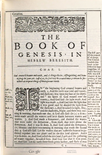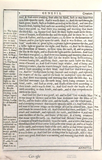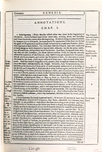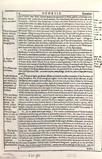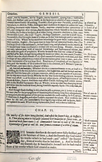God createth heaven and earth, and all things therein; distinguishing and beautifying the same. (26) Last of all, the sixth day he createth man; to whom he subjecteth all corporal things of this inferior world.
IN • the beginning • God created heaven and earth. 2And the earth was void and vacant, and darkness was upon the face of the depth: and • the Spirit of God moved over the waters. 3And God said: Be light made. And light was made. 4And God saw the light that it was good: and he divided the light from the darkness. 5And he called the light, Day, and the darkness, Night: and there was evening and morning, that made one day. 6God also said: Be [a] a firmament made amidst the waters: and let it divide between waters and waters. 7And God made a firmament, and divided the waters that were under the firmament, from those that were above the firmament. And it was so done. 8And God called the firmament, [b] Heaven: and there was evening and morning that made the second day. 9God also said: Let the waters that are under the heaven be gathered together into one place: and let the dry land appear. And it was so done. 10And God called the dry land, Earth, and the gathering of waters together, he called Seas. And God saw that it was good. 11And said: Let the earth shoot forth green herbs, and such as may seed and fruit-trees yielding fruit after his kind, such as may have seed in itself upon the earth. And it was so done. 12And the earth brought forth green herb, such as seedeth according to his kind, and tree that beareth fruit, having seed each one according to his kind. And God saw that it was good. 13And there was evening and morning that made the third day. 14Again God said: Be there lights made in the firmament of heaven, to divide the day and the night, and let them be [c] for signs and seasons, and days and years; 15to shine in the firmament of heaven, and to give light upon the earth. And it was so done. 16And God made • two [d] great lights; a greater light, to govern the day, and a lesser light to govern the night; and stars. 17And he set them in the firmament of heaven, to shine upon the earth, 18and to govern the day and the night, and to divide the light and the darkness. And God saw that it was good. 19And there was evening and morning that made the fourth day. 20God also said: Let the waters bring forth creeping creature having life, and flying fowl, over the earth under the firmament of heaven. 21And God created huge whales, and all living and moving creature, that the waters brought forth, according to each sort, and all fowl according to their kind. And God saw that it was good. 22And he • blessed them saying: Increase and multiply, and replenish the waters of the sea: and let the birds be multiplied upon the earth. 23And there was evening and morning that made the fifth day. 24God said moreover: Let the earth bring forth living creature, in his kind, cattle, and such as creep, and beasts of the earth according to their kinds: and it was so done. 25And God made the beasts of the earth according to their kinds, and cattle, and all that creepeth on the earth in his kind.
And God saw that it was good, 26and he said • Let us make Man to our image and likeness: and let him have dominion over the fishes of the sea, and the fowls of the air, and the beasts, and the whole earth, and all creeping creature, that moveth upon the earth. 27And God created man to his own image: to the image of God he created him, male and female he created them. 28And God blessed them, and saith: • Increase and multiply, and replenish the earth, and subdue it, and rule over the fishes of the sea, and fowls of the air, and all living creatures that move upon the earth. 29And God said: Behold I have given you all manner of herb that seedeth upon the earth, and all trees that have in themselves seed of their own kind, to be your meat: 30and to all beasts of the earth, and to every fowl of the air, and to all that move upon the earth, and wherein there is life, that they may have to feed upon. And it was so done. 31And God saw all things that he had made, and [e] they were very good. And there was evening and morning that made the sixth day.
Footnotes
- ^ The firmament is all the space from the earth to the highest stars: the lowest part divideth between the waters on the earth and the waters in the air, St. Aug. li. II de Gen. ad lit. ch. 4.
- ^ Likewise heaven is all the space above the earth; in whose lowest part are birds and waters, in the higher part stars: the highest is the Empyrial heaven, Esa. 66.
- ^ The lights made the first day are disposed the fourth day in their proper courses for more distinction of times, St. Dionys. ca. 4. de divin.nom. St. Tho. p. 1. q. 67. a. 4. & q. 70. a. 2.
- ^ The Sun and Moon: for though the moon be the least visible star except Mercury, yet it giveth more light on the earth by reason it is nearer, and so Moyses speaketh according to the vulgar capacity and use of things, St. Aug. li. 2. de Gen. ad lit. cap. 16.
- ^ Every creature in nature is good, but all considered together make the whole world perfect, most apt to man’s use and God’s glory, St. Aug. li. 1. de Gen. cont. Manich. ca. 21.
ANNOTATIONS. CHAP. I.
↑ 1. In the beginning.) Holy Moyses telleth what was done in the beginning of the world, and so forward even until his own time, writing above two thousand and four hundred years after the beginning. All which being incomprehensible by human wit or discourse, he knew partly by revelations from God, for he had the gift of Prophecy in most excellent sort; partly by traditions from his elders, who learned of their fathers. For until that time the Church had only traditions of such things as were revealed to special men, whereby we see the great authority of traditions, before there were Scriptures. And since Scriptures were written they are also necessary, for three special reasons. First, for that we are only assured by tradition of the Church, that those books are indeed holy Scriptures, which are so accounted, and not by the Scripture itself, for that were to prove the same by the same, until we be assured of some part, that proveth some other parts. And this made St. Augustine to say plainly, that he could not believe the Ghospel, except the Church told him which is the Ghospel. Secondly, holy Scriptures being once known to be the word of God, and so of most eminent authority of all writings in the world, as St. Augustine, St. Jerome, and all other Fathers agree, yet for the true understanding of the same, both the Scripture itself, and the ancient Fathers remit us to the Church, namely to those in the Church, that are appointed by God’s ordinance, in the high place that he hath chosen. Which were the High Priests in the old Testament, as appeareth Deut. 17, Mat. 23, Joan. 11. And in the new Testament, St. Peter and his Successors, for whom Christ prayed that his faith should not fail: and therefore commanded him to confirm his brethren, Lk 22. Thirdly for things not expressed in particular in holy Scripture, the Scripture * and Fathers do likewise remit us to traditions, and to the judgement and testimony of the Church. Christ saying to his Apostles: He that heareth you heareth me. The Apostles doubted not to say: It seemed good to the Holy Ghost and to us. And St. Paul willed the Thessalonians to hold the traditions, which they had learned, whether it were by word, or by his Epistle.
↑ 1. In the beginning God created heaven and earth.) All writers * ancient and later find such difficulties in these first Chapters, that some, otherwise very learned, have thought it not possible to understand the same according to the proper and usual signification of the words, as the letter may seem to sound, but expound all allegorically, as that by the waters above the firmament should be understood the blessed Angels, by the waters under the firmament wicked spirits, and the like. So did Origen and diverse that follow him therein. Yea St. Augustine in his books upon Genesis against the Manichees, written shortly after his conversion, when he could not find as he desired a good and probable sense agreeable to the words in their proper signification, expounded them mystically, but afterwards in his other books de Genesi ad literam, he gratefully acknowledgeth that God had given him further sight therein, and that now he supposed he could interpret all according to the proper signification of the words: yet so that he durst not nor would not addict himself to one sense, but that he was ready to embrace another, lest by sticking to his own judgement he might fail. So likewise St. Basil, St. Chrysostom, St. Ambrose, St. Hierome, St. Bede, and other greatest Doctors found and confessed great difficulties in these first chapters, which they with much study endeavoured to explicate. And therefore it is a wonder to see our Protestants and Puritans hold this Paradox, that Scriptures are easy to be understood. Whereas both by testimony of those that have indeed studied and laboured in them, and by a little due consideration the contrary is most evident. For whosoever will look into the holy Scriptures, shall find that sometimes in show one place seemeth contrary to another; sometimes the letter and phrase are obscure and ambiguous; sometimes the sentences imperfect. Again many speeches are prophetical, many parabolical, metaphorical, and uttered under other tropes and figures, and that in the literal sense. Moreover there are three spiritual senses besides the literal, very frequent in holy Scripture. Allegorical, pertaining to Christ and the Church; Moral, pertaining to manners; and Anagogical, pertaining to the next life. As this word, Jerusalem, literally signifieth the head city of Jewry: Morally the soul of man: Allegorically the Church militant: and Anagogically the Church triumphant. And some times this (and the like of others) metaphorically in the literal sense signifieth the Church militant, and not the city of Jewry, as in the twelfth chapter to the Hebrews: and sometimes the Church triumphant, as in the 21st of the Apocalypse.
↑ 2. The Spirit of God.) In the Hebrew it is signified, that the Spirit of God was on the waters to make them fertile, for that fishes and birds were to be procreated thereof; the word is merahepheth, incubabat, sat upon, to produce fruit (saith St. Jerom) from the waters, as a hen by her heat produceth life in the eggs. And the same St. Jerom, and before him Tertullian teach, that this was a figure of Baptism, which consisteth of water and the Holy Ghost. For as water in the beginning of the world received a certain vital virtue of the Holy Ghost to produce living creatures: so also Baptism receiveth virtue of the same Holy Ghost to procreate new men. Whereupon Tertullian calleth Christians fishes, because they are gotten from the waters, and thence have their first spiritual life. Let it not therefore seem strange (saith he) that in Baptism waters give life.
↑ 16. Two great lights, and stars.) Here occurreth another example of the hardness of holy Scripture. For if the two great lights (to wit the Sun and the Moon) and also the stars, were made the fourth day, and not before, as it may seem by the words in this place, then what was that light, and in what subject was it, that was made the first day? St. Basil, St. Gregory Nazianzen, Theodoret, and some others writing upon this place, do think that the light, which was made the first day remained (though an accident) without his subject until the fourth day. And although most other Doctors rather think that the substance of the Sun and Moon, and of other planets, and stars were created the first day, and the fourth day set in that order and course which now they keep, with more distinction for signs and seasons, and days and years; yet it is clear that the foresaid ancient Doctors judged it possible, that accidents may remain without their subject: which a Sacramentary will be loathe to grant, lest it might be proved possible, as both these and all other Catholic Doctors believed and taught, that the accidents of bread and wine remain in the blessed Sacrament of the Eucharist without their subjects, which Protestants deny.
↑ ↑ 22 & 28. Increase and multiply.) Whether this be a commandment or not, at least it is a blessing, for so the words before convince, God blessed them and said: Increase and multiply. He said the same also to brute creatures, which are not capable of a precept, but by this were made fertile. Whereby we see that God’s blessing always worketh some real effect: as of fertility in this and other places, of multiplication of the loaves and fishes, Joan 6. And some real effect Christ’s blessing must needs work also in the Blessed Sacrament, Mat. 26. Which can be no other but changing bread and wine into his body and blood, seeing himself expressly sayth: This is my body this is my blood.
And though God’s blessing in this place, be also a precept, yet it is not to all men for ever, but for the propagation of mankind, which being long since abundantly propagated, the obligation of the precept ceaseth, the cause ceasing. So St. Cyprian, St. Jerome, St. Augustine, and other Fathers expound this place. And confirm the same by the text, for immediately God signifying to what end he spoke, saith: and replenish the earth. Which being replenished, God’s will is therein fulfilled.
↑ 26. Let us make man to our Image.) For better consideration of God’s bounty towards us, and stirring ourselves to gratitude towards him, we may here note ten prerogatives bestowed on us by our Lord and Maker in our creation, above all other earthly creatures. First, whereas God by an imperial word of commandment made other creatures, Fiat lux, Fiat firmamentum: Be there light: Be there a firmament: intending to make man, he proceedeth familiarly, by way, as it were, of consultation, and as to his own use and service to make man, saying: Let us make man to our image and likeness; that is to say, a reasonable creature with understanding and free will, which beasts have not. Secondly, in this work God first insinuateth the high Mystery of the Bl. Trinity, or plurality of Persons in one God (because man is to believe the same) signifying the plurality of Persons by the words Let us make, and to our: and the unity in substance, by the words Images and likeness, the first in the plural number, the later in the singular. Thirdly, other creatures were produced by the waters and earth, Let the waters bring forth (fish and fowl), Let the earth bring forth (grass, and cattle, and other beasts) but God brought forth man, not by the earth, though of the earth, nor by water, nor by heaven, nor by Angels, but by himself, giving him a reasonable soul, not sensual only as to beasts, and the same not produced of any creature, but created immediately of nothing. Fourthly, God gave man Paradise, a most pleasant place, to dwell in. Fifthly, God gave man dominion and imperial authority over all living creatures under heaven. Sixthly, man was created in that innocence of life, and integrity of all virtues, that his mind was wholly subject to God, his sense to reason, his body to his spirit, and all other living creatures obedient to him: even the terrible Lions, the cruel Tigers, the huge Elephants, and the wildest birds. Seventhly, God brought them all to man, as to do him homage, and to take their names of him. Which by his excellent knowledge he gave them conformable to their natures. Eighthly, God gave man in some sort an immortal body, that if he had kept God’s commandment, he had lived long and pleasantly in this world, and so should have been translated to eternal life without dying. Ninthly, God did not only adorn man with all natural knowledge and supernatural virtues, but also with the gift of prophecy. Whereby he knew that Eve was a bone of his bones, and flesh of his flesh, though being asleep he knew not when she was made. Tenthly (which was the chief benefit of all) God conversed familiarly with man, and that in shape of man, which was a token of his marvellous great love to man, and a singular incitement of him to love God. Read more, if you please, of the dignity of man, and the benefits of God towards him in his creation, in St. Bernard upon the 99th Psalm, and upon the 61st chapter of Esay.
↑ 28. Increase and multiplie.) Whether this be a commandment or no, at least it is a blessing, for so the words before convince, God blessed them and said: Increase and multiply. He said the same also to brute creatures, which are not capable of a precept, but by this were made fertile. Whereby we see that God’s blessing always worketh some real effect: as of fertility in this and other places, of multiplication of the loaves and fishes, Joan 6. And some real effect Christ’s blessing must needs work also in the Blessed Sacrament Mat. 26. Which can be no other but changing bread and wine into his body and blood, seeing himself expressly saith: This is my body this is my blood.And though God’s blessing in this place, be also a precept, yet it is not to all men for ever, but for the propagation of mankind, which being long since abundantly propagated, the obligation of the precept ceaseth the cause ceasing. So St. Cyprian, St. Hierome, St. Augustin and other Fathers expound this place. And confirm the same by the text, for immediately God signifying to what end he spoke, saith: and replenish the earth. Which being replenished, God’s will is therein fulfilled.
Margin Notes
- intro. The first part. Of the creation of al things.
- intro. The Church readeth this book in her Office from Septuagesima until Passion Sunday.
- intro. Also this first chapter and beginning of the second on Easter Eve before Masse.
- annot. 1. in the beginning. The Church had only traditions and no Scripture above 2400 years.
- Traditions necessary for three causes.
- Scripture of most eminent authority.
- annot. 1. in the beginning God made heaven and earth.
- Scriptures hard.
- Why Scriptures are hard.
- Three spiritual senses besides the Literal. Allegorical. Moral. Anagogical.
- annot. 2. the spirit of God.
- A figure of Baptism.
- Christians called fishes.
- annot. 16. two great lights and stars
- Light being an accident remained without a subject, by the judgement of some learned Fathers.
- The accidents of bread and wine can remain by God’s power without their subjects.
- annot. 26. let us make man to our image. Ten prerogatives of man in his creation.
- Made like to God.
- The Mystery of the Bl. Trinity insinuated in his creation.
- Produced by God himself.
- Placed in Paradise.
- Lord of all earthly creatures.
- Innocence.
- Excellent knowledge.
- Power to live ever.
- Gift of prophecy.
- God conversed familiarly with man.
- annot. 28. increase and multiply.
- God’s blessing always effectual.
- Especially in the holy Eucharist.
- Not all men and women commanded to marry.
Margin References
- 1.
- Act. 14, 15. 17, 24.
- Psal. 32, 6. 135, 5.
- Eccl. 10, 1.
- Heb. 11, 3.
- 6.
- Job 38.
- Jer. 10, 13.
- 26. Col. 3, 10.
- 27. Mat. 19, 4.
- annot. 1. in the beginning. Cont. Epist. sund. ch. 5.
- annot. 1. in the beginning. *
- Luc. 10, 16.
- Act. 15, 28.
- 2 Thess. 2.
- annot. 1. in the beginning God made heaven and earth. *
- Ori. super. gen. ch. 1.
- Aug. lib. 2 de Gen. cont. Manich. ca. 2 lib. 1 ch. 18 & lib. 8 ch. 2.
- Bas. ho. 9 in Genes.
- Chriso. epist 44.
- Amb. & Beda in examen.
- Jerom. Ep. ad. Eust.
- annot. 1. in the beginning God made heaven and earth.
- Gen 1, 3. 14.
- Exo. 20, 5 & 18, 20.
- Joan. 8, 25.
- Rom. 8.
- annot. 2. the spirit of God. Hier. Epist. 83. ad Ocea. Tert. de Baptis.
